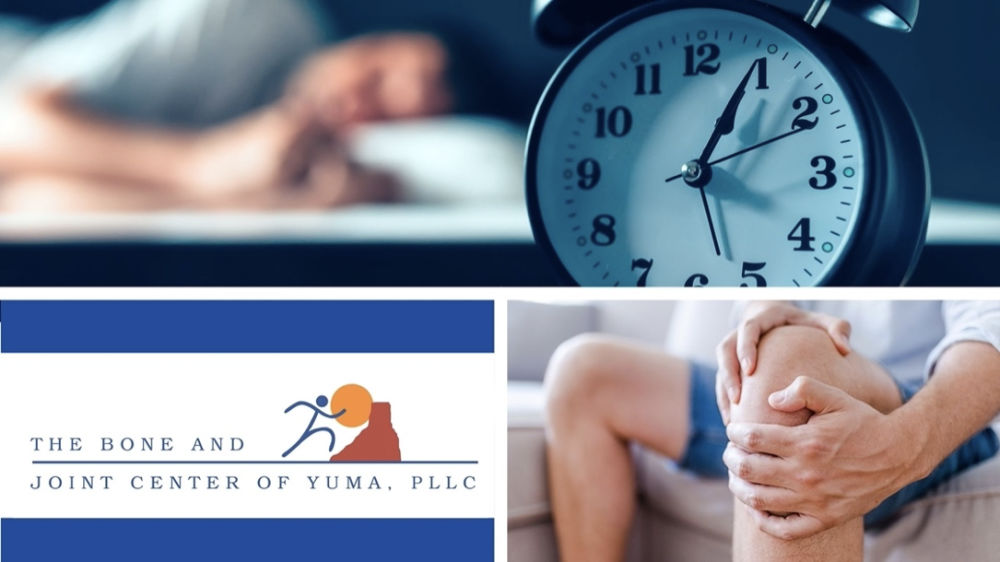How Sleep Patterns Effect Joint Pain and Arthritis
October 14, 2021
Everyone knows that poor sleep is bad for your health, but did you know that a restless night might have adverse effects on your joints as well? For many, this is because the pain of arthritis keeps them from enjoying a full night’s sleep. Joint pain can be excruciating, especially when attempting to find a comfortable position in which to sleep.
This is especially true for people with osteoarthritis. According to the Arthritis Foundation, about 70% of people with OA and up to 80% of patients with arthritis have trouble sleeping. These sleep issues range from trouble falling asleep or staying asleep to waking up earlier than expected.
There are a few reasons that people with joint pain might have trouble sleeping. Typically, the cycle of poor sleep and joint pain feed into one another. This is to say, poor sleep causes inflammation and pain during the day and later in the night, which leads to poor sleep. There are even suggestions that the time of day can attribute to more or less pain in your joints.
Increased Pain at Night
It is commonly attributed that joint pain and arthritis increase at night, but what is it about the nighttime that seems to worsen our pain? Unfortunately, no one knows for sure, but some researchers have theories.
Some believe that your body’s circadian rhythm is to blame. In those with rheumatoid arthritis, the chemical cortisol is released in much lower doses at night. Cortisol is a natural anti-inflammatory chemical, so having lower levels might lead to more joint pain at night. On the flip side, the nighttime release of cytokines (which are pro-inflammatory proteins) equates to an increased number of cells traveling to inflamed tissue. Finally, our bodies release higher levels of melatonin and prolactin at night to aid in sleep. These chemicals can also increase inflammatory cytokines.
Sleep Deprivation and Pain Tolerance
Johns Hopkins University is well-known for its studies on sleep. One such study compared the reaction of pain tolerance in volunteers with interrupted sleep schedules. The study was conducted by Dr. Burel Goodin, now an associate professor of psychology at the University of Alabama, Birmingham. In the study, Goodin explains that sleep deprivation can promote sensations in the central nervous system.
In the experiment, healthy volunteers were tested for pain sensitivity before the experiment began. Some of the volunteers had their sleep hours reduces, while others were woken up throughout the night, resulting in the same lack of sleep. At the end of the experiment, the volunteers were given the same pain sensitivity tests and all of the volunteers reported a rise in pain sensitivity after a poor night’s sleep. Those with interrupted sleep reported the highest levels of sensitivity.
Tips for Better Sleep
As studies show, sleep can have adverse effects on pain, especially for those who experience pain regularly or suffer from joint issues. The best course of action is to follow good sleep hygiene practices. These include:
- Create a bedtime ritual by going to bed and waking up at the same time every day
- Clear your mind before you go to sleep. If needed, write down your thoughts, meditate, take a bath, or take part in another calming activity
- Keep your room dark, cool, and quiet
- Avoid electronic devices and tv right before bedtime
- Avoiding stimulants like caffeine, alcohol, and tobacco at night
- Don’t take naps during the day
- Get plenty of low-impact exercise during the day, but avoid exercise in the evening
- Plan a balanced meal in the evening and a light snack if nighttime hunger is an issue
- Do not use your bed for working or watching tv
- Invest in a comfortable, supportive mattress and quality pillows
- If you have issues getting comfortable, try different pillow positioning, such as putting a pillow between your knees or under your hips
Identifying the Source of Your Pain
For those with arthritis, nighttime pain is common. Unfortunately, sleep deprivation is sometimes both a symptom and a cause of nighttime pain. While pain can make sleep worse, low-quality sleep can intensify your pain and increase stress levels. This often presents a vicious cycle of bad sleep and joint pain.
For those who struggle with nighttime pain, it’s important to address both the insomnia and the pain. Utilizing preventative techniques, the right medications, and lifestyle adjustments can help you sleep better and experience less discomfort. The Bone and Joint Center of Yuma, PLLC has years of experience identifying the source of pain and finding solutions that best work for you. Contact us today to get in touch with our doctors or request an appointment.